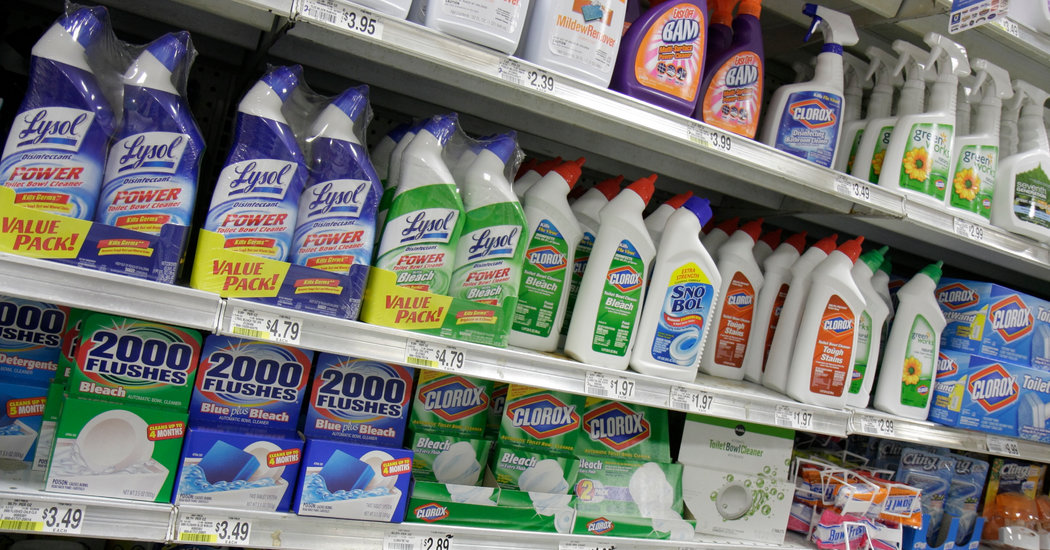[ad_1]
The makers of Lysol and state officials repeated warnings Thursday and Friday about the dangers of ingesting disinfectants or cleaning products as a way to treat or prevent illnesses caused by the coronavirus.
Reckitt Benckiser, the British company that makes Lysol and Dettol, warned customers on Friday against using disinfectants as treatments, saying that “due to recent speculation and social media activity,” it had been asked about the “internal administration” of disinfectants.
“As a global leader in health and hygiene products, we must be clear that under no circumstance should our disinfectant products be administered into the human body (through injection, ingestion or any other route),” it said in a statement, advising people to use the products in line with guidelines.
Accidents with household cleaning products appear to have sharply increased in recent weeks, according to doctors who monitor activity at poison call centers. On Monday, the Centers for Disease Control and Prevention reported an alarming trend of growing calls to poison control centers, and a significant increase in accidental exposures to household cleaners and disinfectants.
On Friday, the American Cleaning Institute, which represents companies in the cleaning products industry in the United States, echoed the warnings against the improper use of disinfectants.
“Disinfectants are meant to kill germs or viruses on hard surfaces,” it said in a statement. “Under no circumstances should they ever be used on one’s skin, ingested or injected internally.”
Officials in Washington State, where researchers believe that hidden outbreaks were creeping through Seattle early this year, said Thursday night on Twitter that people should not consume laundry detergent capsules or “inject yourself with any kind of disinfectant.”
“Just don’t make a bad situation worse,” the state’s emergency management authorities said.
The message was an apparent reference to Mr. Trump’s remarks at the White House briefing on Thursday. William N. Bryan, the head of science at the Department of Homeland Security, told the briefing that the government had tested how sunlight and disinfectants — including bleach and alcohol — can kill the coronavirus on surfaces.
Mr. Trump then speculated about the possible medical application of disinfectants.
“And then I see the disinfectant where it knocks it out in a minute — one minute — and is there a way we can do something like that by injection inside, or almost a cleaning?” Mr. Trump asked. “Because you see it gets in the lungs and it does a tremendous number on the lungs, so it would be interesting to check that.”
On Friday morning, the White House press secretary, Kayleigh McEnany, said that Mr. Trump’s comments were taken out of context by the news media.
“President Trump has repeatedly said that Americans should consult with medical doctors regarding coronavirus treatment, a point that he emphasized again during yesterday’s briefing,” she said.
Doctors and manufacturers have warned for years about the risks associated with some household cleaners, and bottles of bleach and other disinfectants carry warnings saying that it is dangerous to ingest them, and potentially fatal. In its report this week, the Centers for Disease Control and Prevention said that calls to poison hotlines this year for cases involving cleaners and disinfectants rose significantly compared with the same period over the previous two years. The report charts a significant spike in March for both categories.
There are no products, vaccines or drugs approved to treat or cure the coronavirus. Federal and local officials have previously spoken out against medical misinformation, particularly when it appears online or when untested products are advertised as cures for Covid-19 or other viruses and severe illnesses.
The Trump administration in March warned to stop selling products that claim to cure or prevent the coronavirus, including teas, essential oils, tinctures and colloidal silvers.
On Thursday, Mr. Trump also asked officials about testing the effects of light on the virus. “Supposing we hit the body with a tremendous — whether it’s ultraviolet or just very powerful light,” Mr. Trump said. “And I think you said that hasn’t been checked, but we’re going to test it?” he added, turning to Mr. Bryan, the Homeland Security official. “And then I said, supposing you brought the light inside the body, either through the skin or some other way.”
Ultraviolet lamps can harm humans if used improperly, experts warn. When Mr. Trump asked Dr. Deborah Birx, the White House coronavirus response coordinator, whether she had heard of the success of sunlight as an effective tool against viruses, and more specifically the coronavirus, she replied, “Not as a treatment.”



















